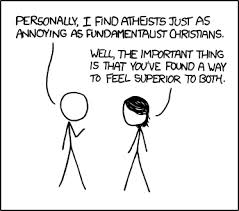 Reza Aslan’s latest Salon article worries me. Not just because of the content – that’s the same as always and like Jerry Coyne at Why Evolution is True, I’m getting a bit tired of it. What worries me is that I’m starting to recognize his style. I haven’t actually read that much of his writing, but already I know not only how the arguments will proceed, but what the conclusions reached will be. I’m clearly reading too much of his work. There are other writers whose work I couldn’t recognize as easily, but I’d be far better off being familiar with.
Reza Aslan’s latest Salon article worries me. Not just because of the content – that’s the same as always and like Jerry Coyne at Why Evolution is True, I’m getting a bit tired of it. What worries me is that I’m starting to recognize his style. I haven’t actually read that much of his writing, but already I know not only how the arguments will proceed, but what the conclusions reached will be. I’m clearly reading too much of his work. There are other writers whose work I couldn’t recognize as easily, but I’d be far better off being familiar with.
It seems to me he started to write an article damning atheists, but recognizing that there are a few of us now who will pick up on any errors, decided to do a bit of research first. In doing so he found out that we’re not the evil creatures many religious seem to think we are, and he had the honesty to point it out:
Unfortunately, this historical [semantic] connection between lack of belief and lack of morals is one that still plagues atheism today, despite studies showing atheists to be, as a whole, less prejudiced, less willing to condone violence, and more tolerant of sexual, ethnic and cultural differences than many faith communities.
Once he’d recognized that atheists in general are good people, he had to find a way to get in his usual dig at Sam Harris, with a side-swipe at Richard Dawkins so it doesn’t look too much like he’s obsessed with Harris. Harris and Dawkins have been labelled “New” atheists. According to Aslan, “they give atheism a bad name”. He then does his best to find quotes from both men that show them in a bad light, or are at least likely to offend religious people. Instead of repeating Aslan’s quotes, I thought I’d introduce a couple of different ones:
Aslan seems now to be on some sort of crusade to turn atheists against Harris and Dawkins:
“… it should be perfectly obvious to all that these men do not speak for the majority of atheists. On the contrary, polls show that only a small fraction of atheists in the U.S. share such extreme opposition to religious faith.
In fact, not only is the New Atheism not representative of atheism. It isn’t even mere atheism (and it certainly is not “new”). What Harris, Dawkins and their ilk are preaching is a polemic that has been around since the 18th century – one properly termed, anti-theism.”
Well, duh! Aslan has committed one of the errors common among the religious when discussing atheism. He does it again here:
In the modern world, however, atheism has become more difficult to define for the simple reason that it comes in as many forms as theism does.
 Well, no. There’s only one form of atheism. All atheism means is a lack of belief in gods. Atheists, of course, are people, and like all people, we’re complicated. Each of us is different and unique. No theist can be solely defined by the fact they are a theist, and no atheist can be defined by that one thing either. Most of us are anti-theist as well as atheist, and some aren’t. That doesn’t mean we have any plans to go around attacking theists. Aslan, however, characterizes the anti-theist stance as follows:
Well, no. There’s only one form of atheism. All atheism means is a lack of belief in gods. Atheists, of course, are people, and like all people, we’re complicated. Each of us is different and unique. No theist can be solely defined by the fact they are a theist, and no atheist can be defined by that one thing either. Most of us are anti-theist as well as atheist, and some aren’t. That doesn’t mean we have any plans to go around attacking theists. Aslan, however, characterizes the anti-theist stance as follows:
“… religion [is] an insidious force that must be rooted from society – forcibly if necessary.”
Neither Harris nor Dawkins has ever, as far as I’m aware, advocated violence. In fact, they have spoken out against it. To imply otherwise is inflammatory and irresponsible. To imply that any atheist is planning to force religion from society, especially when his research has shown him that atheists more likely than most to oppose violence, is a reflection of his own intellectual insecurity. Further, it’s reinforcing the negative stereotypes of atheists he’s just acknowledged don’t stack up.
The idea that atheism is an ideology is simply false. I asked the question, “Is atheism an ideology?” on Twitter a couple of days ago to see what other atheists thought. The response was quick and universal. Atheism is NOT an ideology. One even wanted to know what possessed me to ask such a stupid question, so I let everybody know about Aslan’s article in Salon. Below are some of the responses I received within about ten minutes: (Double-click to enlarge.)
Atheists have a wide range of ideologies, of which atheism is only a part. Statistically, there are positions on other matters that an atheist is more likely to hold, but those positions have nothing to do with being an atheist. However, the open-mindedness that often leads to atheism is consistent with the fact that atheists are more likely to be tolerant, non-violent, and accepting of difference. The problem seems to be that society seems to think religion has a special place when it comes to its tenets being questioned. Most people accept the right of others to disagree, but when that disagreement is over religion, the religious often have the opinion that disagreement is abuse. The Organisation of the Islamic Conference (mainly via Pakistan) has been bringing resolutions to the United Nations to try and make defamation of religion a crime since 1999. Numerous non-binding resolutions have been passed by the UNHRC (United Nations Human Rights Council), although they have resisted these calls as incompatible with the UNHRC International Covenant on Civil and Political Rights. Included in those countries that have neither signed nor ratified the Covenant are: Bhutan, Brunei, Burma, Fiji, Oman, Qatar, Saudi Arabia, Singapore, South Sudan, and the UAE. (North Korea tried to withdraw its signing/ratification, but there is no withdrawal provision.)
One of the sources Aslan linked to was Phil Zuckerman’s Atheism, Secularity, and Well-Being: How the Findings of Social Science Counter Negative Stereotypes and Assumptions. Its many findings include the following:
It is often assumed that someone who doesn’t believe in God doesn’t believe in anything, or that a person who has no religion must have no values. These assumptions are simply untrue. People can reject religion and still maintain strong beliefs. Being godless does not mean being without values. Numerous studies reveal that atheists and secular people most certainly maintain strong values, beliefs, and opinions. But more significantly, when we actually compare the values and beliefs of atheists and secular people to those of religious people, the former are markedly less nationalistic, less prejudiced, less anti-Semitic, less racist, less dogmatic, less ethnocentric, less close-minded, and less authoritarian.
And:
If religion, prayer, or God-belief hindered criminal behavior, and secularity or atheism fostered lawlessness, we would expect to find the most religious nations having the lowest murder rates and the least religious nations having the highest. But we find just the opposite. Murder rates are actually lower in more secular nations and higher in more religious nations where belief in God is deep and widespread. And within America, the states with the highest murder rates tend to be highly religious, such as Louisiana and Alabama, but the states with the lowest murder rates tend to be among the least religious in the country, such as Vermont and Oregon. Furthermore, although there are some notable exceptions, rates of most violent crimes tend to be lower in the less religious states and higher in the most religious states. Finally, of the top 50 safest cities in the world, nearly all are in relatively non-religious countries, and of the eight cities within the United States that make the safest-city list, nearly all are located in the least religious regions of the country.
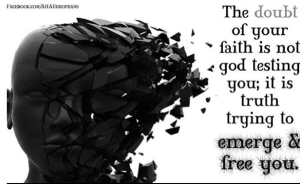 To me, it is an example of the irrational fear theists have of atheists, which comes from knowing deep down the atheists are right, and there is no god. Coming to the realization that there is no god is a very scary idea for many people, and I can understand why that would make them lash out. However, the constant attacks on atheists that they are wrong for questioning religion, rather than religion for being unable to answer, is very frustrating.
To me, it is an example of the irrational fear theists have of atheists, which comes from knowing deep down the atheists are right, and there is no god. Coming to the realization that there is no god is a very scary idea for many people, and I can understand why that would make them lash out. However, the constant attacks on atheists that they are wrong for questioning religion, rather than religion for being unable to answer, is very frustrating.
The only real difference I can see between “New” atheists and old atheists is that “New” atheists speak up and challenge religion. Religion is not used to being challenged and doesn’t like it. The many countries where punishments as heinous as death for blasphemy and apostasy are testament to that. In the West we can at least speak out these days, but for many that means alienation and vilification, which writers like Aslan unconsciously support. (When I became an atheist it didn’t even occur to me that my family would treat me any differently, and they didn’t. I’m one of the lucky ones.)
As always, Reza Aslan acknowledges the negative stereotypes (this time about atheism), gives the evidence that they are wrong, then makes up a way to justify his negative opinion, especially of Sam Harris and Richard Dawkins. This is exactly what he does as an apologist for Islam; he acknowledges the criticisms of extremist Islam are valid, then denies Islam has anything to do with the actions of fundamentalist Muslims, then gets in a dig at Harris and Dawkins. His cognitive dissonance never ceases to amaze me.

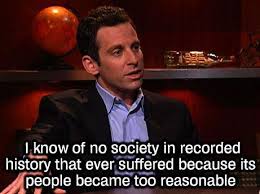
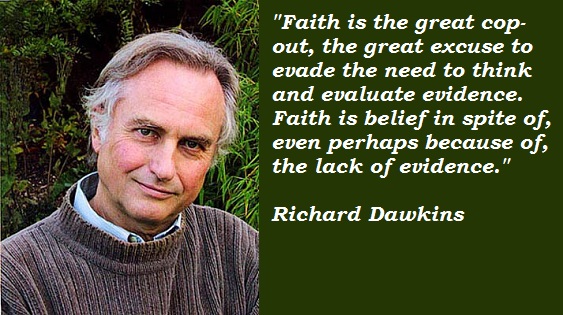

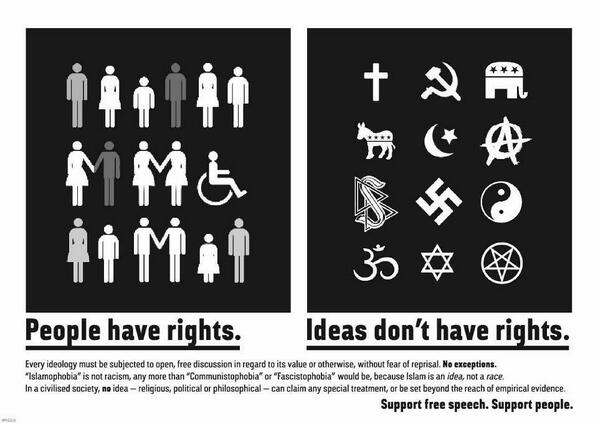
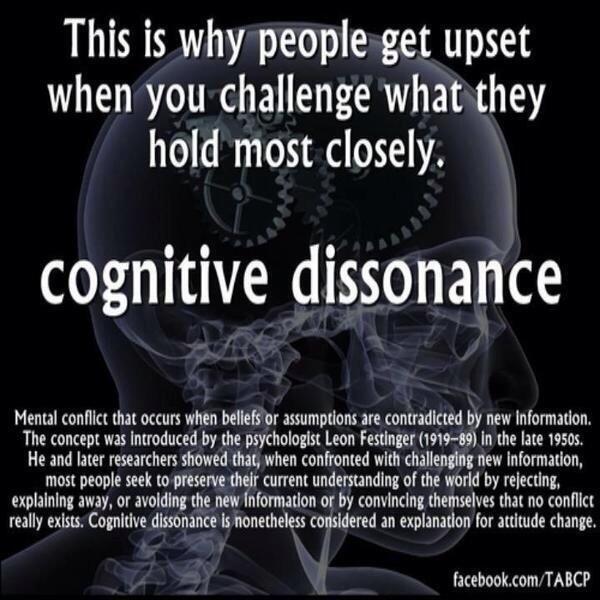
“…“… religion [is] an insidious force that must be rooted from society – forcibly if necessary.”
Forcibly?? WTH? Too bad Aslan isn’t living in England, with their libel laws…
Great post, Heather.
Thanks Diane 🙂
Free speech is great, but we all have responsibilities to and for our fellow citizens too. Just because you can say anything, doesn’t mean you should. (I think those might be someone else’s words, but I’ve no idea who.)
Ha, ha–I dunno, sounds like anyone’s Mom could have said that. 🙂
(BTW, I don’t really want libel laws like England; but I can see how they might keep some writers more careful with the truth…)
That’s one thing I like about Heather’s blog – she allows posts that are critical of her articles. That to me shows intellectual honestly – sadly, some of the atheist blogs these days won’t allow posts where you criticise their articles.
I agree with you there. I’d like to see more discussions with other points of view on other blogs, too. But I suppose authors get too tired of the typical trolls after a while to permit even the reasonably written dissents to appear. Or maybe it’s simply that such interaction demands much more moderation than the authors have time for.
Or, maybe, some atheists are just like some theists, and like to hammer their view of the world down the throat of people and don’t like it when someone expresses a view that might show the bigotry of their views?
You know, theists don’t have a monopoly on propaganda and biased arguments, if you think that just because someone is an atheist, it “automagically” means any argument they make is always based on the truth and is in no way biased, then you are simply misinformed.
I remember many years ago, one of the main atheist websites of that time (I forget which) had a biography of Mohammed. It was a scathing biography, and it was one written by an Evangelical Christian.
Now let me ask you this, would an atheist website ever have a section on evolution written by an Evangelical Christian? Of course they wouldn’t, because the Evangelist would not give an unbiased opinion on the topic. Similarly, one cannot expect an Evangelical Christian to write an unbiased biography of Mohammed, you would expect the Evangelist to portray Mohammed in the worst possible light, yet this atheist website had used this biography.
“Once he’d recognized that atheists in general are good people, he had to find a way to get in his usual dig at Sam Harris, with a side-swipe at Richard Dawkins do it doesn’t look too much like he’s obsessed with Harris” – that’s just ad hominem, you have no proof whatsoever that he took a dig at Dawkins for the reason you cite! In case you’re not familiar with Aslan’s writing, he has criticised Dawkins before.
http://www.rawstory.com/rs/2013/08/reza-aslan-atheist-richard-dawkins-is-the-worst-kind-of-zealot/
I also find it very strange that you should think that he “found out that we’re not the evil creatures many religious seem to think we are” – Aslan has never gone around saying atheists are bad. Here is an article by Aslan from July 2010:
http://www.faithstreet.com/onfaith/2010/07/16/harris-hitchens-dawkins-dennett-evangelical-atheists/929
Here you can clearly see he is critical of “New Atheism” and not atheism in itself.
In fact, the difference between someone like Aslan and Dawkins is that Aslan makes a distinction between atheism and new atheism, whereas Dawkins doesn’t make a difference between Islam and Fundamentalist Islam.
BTW, it isn’t just Aslan who criticises Sam Harris – PZ Myers has another article criticising Harris:
http://freethoughtblogs.com/pharyngula/2014/11/24/right-wing-atheism-dismantled/
“I’m hoping Harris retires to doing nothing but touting New Agey pseudo-spiritualism. There’s good money there, I’m sure.”
You raise some valid points in your article, but your article starts to lose credibility when you start resorting to ad hominem attacks against Aslan.
What, in your mind, is the difference between “atheism” and “new atheism”?
http://en.wikipedia.org/wiki/New_Atheism
“There’s only one form of atheism. All atheism means is a lack of belief in gods” – I would disagree. Atheism is a belief. It is the belief that there is/are no God/gods. Once you have a belief in a principle, then that principle influences how you think people should live their life.
If atheism is a driving factor in how an atheist thinks people should live their life, then atheism isn’t simply “a belief in no gods”, it is much more.
You get some atheists who are happy for people to follow religion. You get some atheists who think people should be discouraged from following religion. You get some atheists who believe parents shouldn’t be allowed to teach their kids religion. So, yes, there are different forms of atheism, just like there are different forms of kindness and have you what.
Atheism is not ‘the belief that there is no God’, although there are atheists who believe that, the only thing we all have in common is that we don’t believe in any supernatural God or god. It’s rarely a principle, more often a conclusion reached. It’s an opinion on a single topic, and so is theism. A theist can sacrifice babies to Moloch or adopt them for Jesus, their theism isn’t their key characteristic, it doesn’t determine the rest of their outlook. Atheism is an opinon, it usually isn’t, nor does it deserve to be some kind of guiding principle. What made someone an atheist is likely to affect their other views…but the mere realization that God probably isn’t real doesn’t make as much of a difference as you might think. It often results in a reduction of cognitive dissonance, but it’s the thinking that led them there that will lead them to their future conclusions, not that one conclusion.
The only form of atheism is the form where you don’t believe in any God or gods. The only form of theism is where you do. The other things you are, are in addtion to that, not transformations of it. There ARE different kinds of atheists. There are skeptical atheists, indifferent atheists, anti-theist atheists, humanist atheists, agnostic atheists…there are at least three of those you can be at the same time. There are Christian theists, Muslim theists, and so on. But ‘theism’ more properly describes ‘Christian’, not vice versa. You can say ‘Islamic theism’, but it means the same thing as ‘theistic Islam’. The meaning of ‘theism’ isn’t altered by ‘Islamic’ as an adjective, it’s still just believing in at least one God or god. Using ‘theistic’ as an adjective is informative, in case you didn’t know the religion had belief in a God or gods as a feature. Using ‘Islamic’ as an adjective adds nothing, you might as well have left the word ‘theism’ out.
When a particular belief in something drives your outlook on how society should be, then, yes, it does become an ideology.
My belief that smoking is harmful to health drives my normative belief that people shouldn’t smoke. Therefore believing smoking is harmful, regardless of why I believe it, is ideology?
You seem rather confused…..
Andrew,
I think your confusion arises from the fact that you don’t understand the connotations surrounding the word “ideology”. An ideology is something that affects your outlook on how life in general should be.
Smoking is a very specific thing, therefore it cannot be an ideology. If a Muslim believes she should cover her entire body, and so should others, even that isn’t an ideology – it’s a very specific belief.
But if you believed that smoking harms health, and people should not smoke, and you believed cigarettes should be banned, and anyone selling cigarettes should be jailed, and any country producing cigarettes should be invaded and occupied so they didn’t sell cigarettes anymore, and no one should have the right to say they should be able to smoke, and all books and television shows and movies should have cigarettes erased from them – well, now your belief about cigarettes can be described as an ideology because of the far-reaching broad consequences it has.
I hope this clears up your confusion.
Excellent post. So glad WEIT shared the link!
Thanks 🙂
“New” atheists are just like old atheists, except you’re not allowed to burn them at the stake.
Actually, your quote from Aslan is misleading. He says
The emphasis is mine. He doesn’t suggest that Harris or Dawkins holds this view.
Check out the full paragraph in Aslan’s article that starts, “Atheists often respond that atheism should not …”. The implication that Harris and Dawkins would use any means to rid society of religion is clear imo.
Nice job, Heather.
“Neither Harris nor Dawkins has ever, as far as I’m aware, advocated violence.”
This statement is false if you have read all of Harris’ works. Please read page 52-53 of his book, “The End of Faith” and accompanying notes. Read in its entire context, one finds ample evidence of Harris advocating violence. Justification for violence is irrelevant to claim that, as far as you know, he has never advocated violence.
Additionally, to show that I am familiar with claim in sentence I quoted and calling you out is well-informed, you can read one person who could agree with you here, quoting from same place in said book:
http://www.canadianatheist.com/liberals-acting-badly-the-smears-against-sam-harris-continue/
Wonderful how he exposes the wekeanss of faith and the falseness of the claim of a loving god when by by him simply living the so Christians pour intolerance, hatred, bigotry and persecution towards him!It fully demonstrates how shallow and nasty Christianity has become and posts like yours prove him so, so right!The atheist secret is to have this site so that you can post to drive non believers away and drive decent people out of the churches to become atheists to get away from any chance of being associated with people with your attitudes!Have you ever considered trying to find a loving god and acting like it?!
If there was a direct threat to the secular democracies we live in by religion, then I am sure Harris and Dawkins et al would advocate violence. I am sure they would also justify the killing of civilians if they felt this was the only way they could save the secular democracies we live in. I can just imagine the argument: “killing of civilians is a terrible act, but sometimes in life, we are left with no choice and the end justifies the means”…
It reminds me of a debate I once had with an American – he kept on saying that Hamas are the sc*m of the earth, that he hates Hamas because they kill civilians, that killing civilians is never ok” etc, so I said to him that if that is his opinion, will he condemn the killing of hundreds of thousands of Japanese civilians in Hiroshima and Nagasaki? And suddenly he started saying “oh, that was a really terrible thing that happened, but it was the only way to end the war”. In other words, to him, killing civilians was never ok if someone else did it, but when his side did it, it could be ok!
So when Hamas say that they target Israelis indiscriminately because they do not have the weapons to harm them militarily, that they have no other choice but to do this to save the Palestinians from oppression, and that if the West provided them with high-tech weaponry, then they would use that to attack Israeli military institutions – this wasn’t good enough for him. No, they could never have a reason that could justify the killing of civilians, only we could.
So whenever someone takes the moral high ground and says X is evil because X targets civilians and they don’t, I always chuckle, because that person is in a position where he doesn’t need to justify the killing of civilians, but you can bet your bottom dollar that if that person ever found themselves in a position where their way of life was under threat and the only way they could save their way of life was with indiscriminate attacks against the other side, including the killing of civilians, then that person would suddenly justify the killing of civilians.
Hi Heather,
You write: “[Aslan’s] cognitive dissonance never ceases to amaze me”. I do often hear that theists suffer from cognitive dissonance, but I don’t think theists have a monopoly on this, for I have seen atheists also suffer from this. After all, atheists are normal human beings, so it is only natural that some of they would also suffer from cognitive dissonance.
A perfect example of an atheist suffering from cognitive dissonance is Jerry Coyne. Now Jerry comes from a scientific background (as do I) so you would expect Jerry to be able to look at facts presented before him, and then form his conclusion based on the facts. He however forms his conclusion first when it comes to Islam (and maybe other religions too), and then tries to mould the facts to fit the conclusion – that is about as unscientific as one can get and is a clear sign of cognitive dissonance.
A perfect example is presented by Neil Godfrey, who posted in one of your earlier posts about Reza Aslan.
http://vridar.org/2013/04/10/jerry-coynes-reply-bangladeshi-muslim-demonstrators-and-atheist-bloggers/
And of particular interest is this comment in response to those defending Coyne:
http://vridar.org/2013/04/10/jerry-coynes-reply-bangladeshi-muslim-demonstrators-and-atheist-bloggers/#comment-19303
What I find interesting about Coyne’s website is that he doesn’t allow comments that expose his cognitive dissonance. When I was younger, I believed that only theists want to hammer their view of the world down others, and that atheists are only interested in honest, open debate, but when I matured into an adult, I came to the realisation that atheists are just like theists, and one of the perfect examples in my my mind of how similar they are is that just like a lot of religious people detest being shown similarities they have with atheists because they believe they’re in some way better, a lot of atheists hate being being shown that they have the same similarities as religious people (intellectual dishonesty, suppressing freedom, cognitive dissonance etc) because they believe they’re in some way better.
This is why I lost interest in the “religion-atheism” debate – I got tired of the intellectual dishonesty emanating from both sides.
Hi AU – sorry I haven’t been replying to you. I agree there are atheists who aren’t very good at listening to other points of view. Often it’s just because it’s an argument they’ve heard over and over again before and have just had enough, and the next person they hear it from is the one that gets a hard time. It can also be difficult just being an atheist because of the inaccurate stereotypes in society that lead to us being constantly and unfairly attacked by some. Remember, there are countries where being an atheist is a crime punishable by death. This has made some quite defensive. I’m probably less defensive because being an atheist is not such a big deal in NZ – about 40% of the population is atheist.
I like Jerry Coyne, and I comment on his site. I don’t agree with everything he says, and I’m sure he doesn’t agree with everything I say. However, imo he’s perfectly entitled to do whatever he wants with his own website. I’m happy for people to disagree with me on my site and offer alternative points of view, but I do expect them to do it respectfully. If I think someone is being rude, nasty, ignorant, bigoted, racist, sexist, homophobic etc, I will stop them commenting – I don’t put up with that in my real life, especially in my own home, and I won’t put up with it here. I value intelligent debate, and am genuinely interested in what others think, but the argument mustn’t devolve. I’ve already told one person to express himself more politely. He’s chosen not to comment again.
Hi Heather,
That’s ok, I appreciate life is busy and often we cannot reply straight away.
I disagree with what you say here:
“However, imo he’s perfectly entitled to do whatever he wants with his own website”.
I believe that if you have a website where you criticise X, then you should give people who want to express alternative views the chance to do so – not doing so and only allowing your point of view across is IMHO a kind of brainwashing.
Thanks.
Hi AU, I agree with your point of view, which is one of the reasons I allow dissenting opinion. I just don’t think I have the right to tell anyone else what they should or shouldn’t do in these circumstances. Like Jerry, I see my website as an extension of my home – he has different rules for his own home than me. Whatever we feel about his stance, when it comes to his own home, we need to suck it up.
Mindless chemical reitacon does not mean the end product is mindless.Designer does not need to be design, this is what you ID guys yell all the time, so, why would it be any different for us?Humans don’t need designer.But unlike your designer, we actually have an explanation where we came from.
Hi Heather,
Sorry for the delay in posting this comment to the piece you wrote couple of weeks ago on Reza Aslan’s article about new-atheism, but as a newcomer to the works of Harris and Dawkins et al, I’m intrigued, and a little disappointed, by the way both sides in this debate tend to evade key points being made (because they’re difficult), and cherry-pick other aspects to focus on (because they’re easier).
I’m a huge admirer of the new-atheists, Jerry Coyne’s ‘Why Evolution Is True’ my favourite book of recent years (through his blog I found your site), and Sam Harris in particular – it’s been many years since I’ve enjoyed someone so articulate, intelligent, consistent, straight-talking, and deeply honest about the pernicious role religions plays in our world.
One of the things I most like about Sam, is his willingness to take very controversial stances: his views on torture, and gun control in the US being good examples.
It seems clear to me both Harris and Dawkins are not shy, nor should they be, in making it very clear that not only are they non-believers, but they actively wish the world was rid of religion.
So when Reza Aslan points this out, and calls it anti-theism, I don’t think we should be afraid to admit this is indeed a big part of new-atheism, and be proud of that.
With this in mind, I was a little disappointed you didn’t address the two quotes Aslan included in his article. Harris: “If I could wave a magic wand and get rid of either rape or religion, I would not hesitate to get rid of religion”; and Dawkins describing religion as: “one of the world’s great evils, comparable to the smallpox virus”.
If we can’t address and confidently defend the most difficult aspects of our stance against religion, aren’t we just in danger of appearing evasive?
regards, Chris (Sussex, UK)
Hi Chris. Thanks for your comments. The reason I didn’t address those comments was mainly because I felt it would give people like Aslan ammunition. The way people like him pore over every little thing Harris, Dawkins etc write and say to try and find something they can use to attack them annoys the hell out of me – in case you’re in any doubt, I find their tactic pathetic. Also, if I’d addressed everything in Aslan’s piece, my piece would have just been too long. I can always go back to what Aslan wrote in the future if his comments are particularly relevant to something I want to address.
I’m currently writing a piece in defence of atheists in general, and American atheists in particular as a follow up to my piece about America hating atheists.
I won’t be backing down from anything, but I will be writing in the way that suits me best, which I suppose is firm but mostly not aggressive. Sometimes people from both sides of the argument won’t like that, but on my website I’m just gonna be me.
Cheers,
Hi Heather,
Thanks for replying to my comment, and so quickly.
It was the first comment I’ve posted on any site/blog/debate, so really value your time and thoughts.
I appreciate one can’t address every point an opponent makes, but I do still feel that in not addressing those two quotes, we’re not really grappling with one of the core points Reza Aslan is trying to make.
It’s ridiculous for him to claim atheism “comes in as many forms as theism does”, but I do think he’s right in making a clear distinction between two differing types: the first being ‘I’m not a believer but I have no problem with religion’, the second: ‘I’m not religious, AND I wish religion didn’t exist’.
Aslan appears to be able to tolerate passive non-believers – I suspect he wishes we’d all just call ourselves agnostics and shut up – but he wants to demonise those of the other type i.e. anti-theists.
I agree that opponents of Dawkins and Harris tend to pour over ‘every little thing’ they write, cherry-pick, quote out of context, and deliberately misrepresent, but I feel the two quotes Aslan selected are actually core to the debate here. Not least because I suspect many atheists are also uncomfortable with these quotes, particularly Sam suggesting he’d wish to rid the world of religion ahead of rape.
I’m finding it increasingly difficult to discuss my views on religion with family, friends, and work colleagues because in my attempt to be open and honest (the only way), I soon display my cards for all to clearly see, and end up talking in blunt terms: I’m not sure (as Hitch claimed) religion poisons everything, but I do see religion as a fundamentally negative force in societies, and a key problem to be overcome.
I agree with, and admire, your intention to be ‘firm but mostly not aggressive’, but I do wonder if we sometimes hold back on addressing what we really think, to evade discussing the more difficult atheist arguments.
Looking forward to your piece in defence of atheists in general – will be interesting to see if you’re able to include the distinction between atheists (passive non-believers) and anti-theists (please god, make religion go away!)
regards, Chris G
Hi Chris, the current piece defending atheists in general ended up getting jettisoned when I read the abhorrent piece by Marcus and decided to take him on instead. In countering him I ended up using some of what I’d already prepared for the defending atheists piece, so at the moment I can’t really write both. Which means you might be disappointed in me again :-(. There will be a more general piece at some time in the future.
I think I might have already said this somewhere, but it seems to me that the only difference between ‘New Atheists’ and the old ones is that we don’t stay in our corner – we stick up for ourselves. As you say, theists just want us to shut up and go away. I’m a bit uncomfortable with the boxes theists try to put atheists in, which is one of the reasons I resist addressing the debate the way they present it. I’m an anti-theist as well as an atheist, but I want, somehow, for theists to work out on their own that they’re wrong. I don’t think it’s something I can force on them, just as they can’t persuade us to believe. Education helps, and I think those of us who are in a position to be outspoken should be, so others know they’re not alone.
As for Harris’s rape comment, it’s not the sort of thing you can give a simple answer to, and I don’t know if he explained what he said at the time. My opinion is getting rid of religion would help more people than getting rid of rape, so if it’s a numbers game, there’s that. Also, I think getting rid of religion would reduce the incidence of rape markedly. A lot of the societal attitude that leads to the rape of women comes from the fact most religions don’t value them equally, and the stigma of not being “pure” is another religious attitude. The rape of men goes unreported because of the stigma of even unwanted homosexual contact that comes from religion. I’ve heard of at least one man in Uganda who was lashed for homosexual contact after being the victim of male rape. There are other arguments that could be made too. Of course, none of this means I think rape is OK, just in case someone reading this decides to misinterpret it that way. So by in large, I support Harris.
Dawkins has often used the idea of a virus to explain the spread of religion, and I mostly agree with the analogy. Comparing religion to smallpox is pretty ‘in your face’, and bound to offend, but it’s a lot less offensive than the abuse thrown at atheists on a regular basis. On its own the comment sounds bad. I personally don’t have a problem with it but it’s not something I would say myself because it’s not my style. It doesn’t reduce my admiration of Dawkins, who’s my favourite prominent atheist.
As one of Richard Dawkins favourite T shirts states: Religion, together we can find the cure.
I agree with you Heather, much better if believers come to their senses themselves rather than us try and brow-beat them into submission.
Although another couple of T shirts come to mind:
– It’s really difficult to reason someone out of a position they didn’t reason themselves in to
– You can lead believers to reason, but you can’t make them think
The atheist philosopher Daniel Dennett takes comfort in believing religions are in their final phases, lashing out as they go, so we just need to be patient and let them die their natural deaths.
I think we need to be more vocal and proactive than that, just to speed things up and wave them goodbye.
So please keep up the great work, from the other side of the world, really enjoying your blog.
regards, Chris.
P.S. Oh, and happy (2 days late) birthday!
Thanks so much for your support Chris, and the birthday wishes. I appreciate it. 🙂
You wrote that:
“The only real difference I can see between “New” atheists and old atheists is that “New” atheists speak up and challenge religion.”
I don’t even think that this is all that true. Earlier atheists certainly challenged the authority of religion, all the way back to ancient Greece and India and beyond. Atheism and Freethought in general seems to rise and subside in waves (with one big interruption during the Middle Ages. Atheists begin to speak out, then apologists (through the media of the time) insult, criminalize, defame and generally shout us down until we are back in our cages again. Then something happens to spur debate again and the process starts over. I hope this never happens again.
Hi Lance
That’s my point really – we used to go back in our cages. Previously, most were too scared to speak out at all, and if they did it didn’t last. In the Middle Ages, speaking out put your life at risk. it still does in many parts of the world. It is illegal to be an atheist in some countries, punishable by death. In Brunei, which has just introduced Sharia law, there is a two year grace period for people to get used to the new regime – when that is up being an atheist is punishable by death. In Saudi Arabia, saying you’re an atheist is specifically mentioned in law as a terrorist act. Nowadays the New Atheists like Dawkins, Harris, Hitchens, Dennet et al keep on going no matter what gets thrown at them. Hirsi Ali has armed body guards constantly, but she keeps speaking out. There’s no risk for me (at least not any that I care about), and I will keep speaking out too, just like many others. This time, they won’t get us back in our cages.
I also think the reason so many are scared of us is that deep down they know we’re right. As atheists disseminate our views, a lot of people will lose power in their petty fiefdoms.
“That’s my point really – we used to go back in our cages. Previously, most were too scared to speak out at all, and if they did it didn’t last.”
In case of Dhaarmic philosophies, your point is provably false. Buddhist thought, which is atheist, thrived on Subcontinent for more than 1000 years. It enjoyed patronage of many rulers as official state philosophy. Jainism, also atheist at core, was on the ascendency in the Kalinga and Magadha empires on Subcontinent.
Your statement may be true of Western experiences. Certainly, it is not case with Subcontinent and China.
I’m not really sure what your point is. My article is about the constant attacks on atheists by theists in a theist-dominated society.
OK, I probably sounded a bit rude there, but I hope you can see where I’m coming from. I admit I don’t know much about China and the sub-continent (except New Zealand beat Pakistan in the cricket today 🙂 ), but I don’t think the experiences of Buddhists, Jainists etc are parallel because although they are not theist, they still rely on a uniting philosophy, which atheism doesn’t, and isn’t. If they had developed differently and, for example, Buddha was worshiped, things might have been different. It is to their credit that they developed the way they did – there is much to be admired there. Cheers.
It was a good match, actually. One has to feel sad for weight under which Pakistan was playing with Peshawar attacks on mind.
I see atheism in West to be quite vibrant, despite attacks from theists. For example, they enjoy domination of science fields, without which modern life is impossible. More specific example is NASA annual budget of almost $20B. Such vibrancy is significant achievement, considering history of 20th-century violence in and perpetrated by West in name of religion-driven politics.
My counter-point to claim that atheists used to “go back in our cages” and to re-iterated point of constant attacks by theists is that they have not always retreated. I gave examples of when atheists have flourished across vast time periods. As for constant attacks from theists, that is nothing new; so I agree with that point in your article. In fact, attacks are more of compliment, no? They are acknowledgement by theists that society can function without God.
I think atheists from West can learn from Jains in India today. They are very respected people, and theists have almost zero problem in sitting side by side and celebrating their festivals.
— I’m an anti-theist as well as an atheist, but I want, somehow, for theists to work out on their own that they’re wrong. I don’t think it’s something I can force on them, just as they can’t persuade us to believe. Education helps, and I think those of us who are in a position to be outspoken should be, so others know they’re not alone.—.
This is one of the paragraphs I like most in this sound discussion with Chris G. Of course, education may help but it is David versus the Goliath of Indoctrination. Specially in Argentina, where I live. My three children and eightteen grandchildren (aged between 39 and 20) know of course that I am an unbeliever who knowingly married their Roman Catholic (grand)mother, and they do not hammer anymore on my error, but they don’t stop praying for my conversion. The most fervent of them is a socially very active nun.
Also, I frankly love those T-shirts inscriptions:
– It’s really difficult to reason someone out of a position they didn’t reason themselves in to;
– You can lead believers to reason, but you can’t make them think.
Right so! Instead of trying to convince someone, I would – just like Cris G. says – immensely enjoy the result of the person’s own reasoning. But I’m afraid I’ll not be here anymore to experience that.
P.D. We have 24 g.grandchildren (between 10 and 0,15 years, the youngest one to be baptized tomorrow!), and one to be born soon; perhaps one of that generation will, one day, say that he would have liked to have a chat with his stubborn forefather… 🙂
Cheers.
P.D. (2) Funny to realize that our “tomorrow” (late afternoon the 16th) will be “yesterday” the 19th) in NZ!
.-
Sorry for my hurry – “tomorrow afternoon is to be the 17th”
Thanks for the kind words.
Congratulations on the new grandchildren! Assuming your family celebrates Christmas, what a lovely Christmas gift! I hope you have a nice time over the holiday period with all your family.
It seems to me people are realizing more and more that religion doesn’t have the answers. Once upon a time the only voices people heard on religion were those that reinforced their beliefs. Now, especially with the internet, that’s changing. Young people in particular are hearing different points of view, and modern education is more about how to think than what to think. They’re working it out in a way their grandparents didn’t get the opportunity to.
Appreciating your nice wishes, I’d like to give you a short account in relation with Christmas gifts. A daughter of mine is active in the very useful help-providing organization ‘Caritas’. Specially in a project that enables poor households to sit around a well-set Christmas dinner table they would otherwise not even think of, thanks to donations of better-off families. It takes a lot of work and a careful organization to bring the two parties together – on paper, that is, they don’t ususally get to know each other).
Incidentally, today was D-day: donors took their boxes to a place where representatives of the nearly 30 parishes in our municipality received them, in order to hand them next week to the receiving families. Most of the latter, knowing that they have been favored to receive the goods, in turn also offer the benefactors a small present, usually some hand-made stuff.
Just to give an idea of the movements involved, I tell you that some 700 boxes changed hands. What I wanted to underline is their proud that this kind of charity is possible in the name of religion. When I point out to them that I have collaborated with that project, and even have volunteered a few years in the Caritas offices, their reaction is a grateful thank-you-very-much to me and particulary to the Divine Providence who has gracefully guided me.
.-
It sounds like a great thing that’s being done, and good on you for helping (despite the reaction!). I recognize the name Caritas – I think it’s here too.